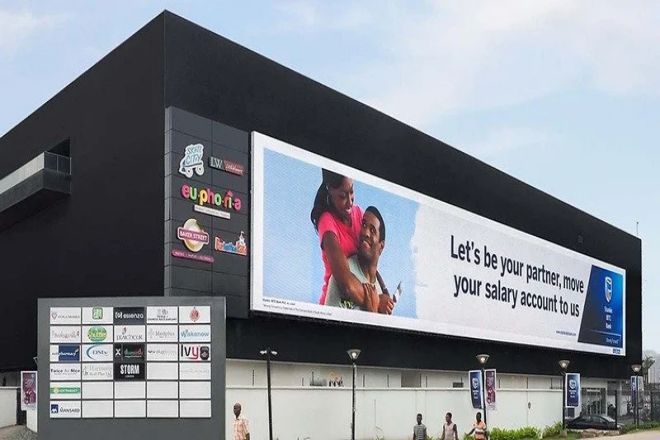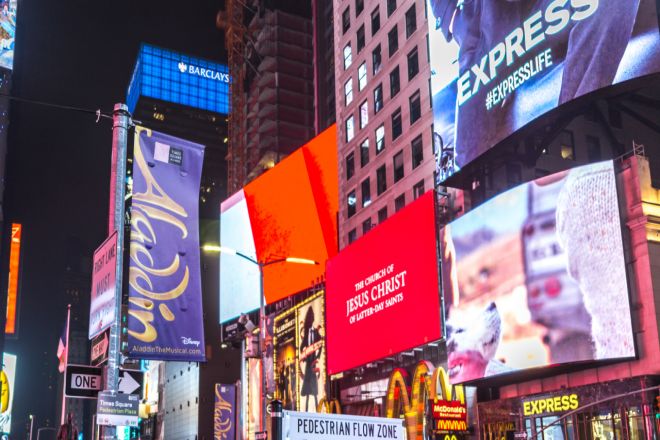Introduction

With the rapid development of technology, LED display screens are becoming more and more widely used as an important medium for modern advertising and information dissemination. However, before investing in LED display screens, we must conduct an in-depth evaluation of the profitability of the project.
This article will discuss in detail how to evaluate the profit potential of an LED display screen from multiple perspectives to help you make a wise decision.
1. Preliminary investment cost analysis

1). Equipment cost
- The impact of display screen specifications, size, and pixel density on price:
The specifications, size, and pixel density of LED display screens directly determine their price level. Large-size, high-resolution display screens are usually more expensive because they require more LED lamp beads and more complex manufacturing processes. Therefore, when choosing a display screen, it is necessary to weigh the trade-offs between size and resolution based on actual needs and budget.
- Price comparison of display screens of different brands and models:
There are differences in the prices of LED display screens of different brands and models. Products of well-known brands are usually more expensive, but the quality and after-sales service are relatively more guaranteed.
Some emerging brands or models may be more competitively priced, but attention should be paid to their quality and reliability. Therefore, when choosing a display screen, factors such as brand, model, price, and quality need to be considered comprehensively.
- Cost of additional equipment (such as control system, power supply, etc.):
In addition to the display itself, the cost of additional equipment, such as a control system, power supply, signal interface, etc., needs to be considered. These devices are important components to ensure the normal operation of the display, and their quality and performance also directly affect the use effect and life of the display.
Therefore, when selecting additional equipment, it is necessary to ensure that its quality and performance match the display and take into account the cost of its maintenance and upgrade.
2). Installation and construction costs
- Choice and preparation of installation location:
The choice of installation location needs to be determined according to the actual site conditions and needs. It is necessary to ensure that the installation location is flat, stable, safe, and in compliance with relevant laws and regulations. Before installation, site preparation is also required, such as building brackets, installing cables, etc., which will incur certain costs.
- Professional level and experience of the construction team:
The professional level and experience of the construction team are crucial to the installation quality and efficiency of the LED display. A professional construction team can ensure the correctness and stability of the display installation and reduce the cost of subsequent maintenance and repair.
Therefore, when selecting a construction team, it is necessary to pay attention to its professional level and experience and ensure that it has the corresponding qualifications and certifications.
- Possible installation time and labor costs:
Installation time and labor costs are important components of installation and construction costs. The installation time and labor costs depend on the size, complexity, and efficiency of the display screen. Therefore, before installation, these factors need to be fully considered, and corresponding plans and budgets need to be made.
3). Operational costs
- Power consumption:
The power consumption of LED display screens is one of the main components of operating costs. The power consumption of the display screen is related to factors such as size, brightness, and usage time. Therefore, when using the display screen, it is necessary to reasonably control its brightness and usage time to reduce power consumption and operating costs.
- Maintenance costs:
LED display screens require regular maintenance and care, including cleaning, replacing lamp beads, checking circuits, etc. This maintenance work requires a certain amount of manpower and material costs. Therefore, when choosing a display screen, it is necessary to consider its maintenance costs and choose products with reliable quality and easy maintenance.
- Update and maintenance costs of display screen content:
If the content of the display screen needs to be updated regularly, the cost of content production and design also needs to be considered. This includes the cost of producing advertising materials, designing animations, and typesetting. These costs depend on specific needs and design complexity.
- Other possible costs:
During the operation process, some other costs may also be incurred, such as insurance costs, property management costs, etc. These costs need to be considered and budgeted according to actual conditions.
2. Market and demand analysis
1). Target market positioning
- Determine the potential audience of the LED display:
First, it is necessary to clarify which industries or fields the LED display will mainly serve, such as advertising media, stage performances, stadiums, traffic signs, etc. According to the characteristics and advantages of the LED display, select a target market that matches it.
- Analyze the advertising demand and competition in the target market:
After selecting the target market, it is necessary to conduct an in-depth analysis of the advertising demand in the market. For example, in the field of advertising media, it is necessary to understand the advertising needs, budgets, and delivery cycles of different types of advertisers.
At the same time, it is also necessary to pay attention to the situation of competitors in the market, including their advertising pricing, service quality, market share, etc.
2). Audience analysis
- Audience characteristics such as age, gender, occupation, and income:
Understanding the basic characteristics of the target audience is the basis for formulating advertising strategies. Through market research or data analysis, grasp the audience’s age distribution, gender ratio, occupational composition, and income level.
This information helps to determine the style, language, and presentation of advertising content, as well as to choose appropriate delivery channels and timing.
- Audience acceptance and preference for LED display advertising:
In addition to the basic characteristics, it is also necessary to understand the audience’s acceptance and preference for LED display advertising. This includes the audience’s preferences for advertising content, acceptance of advertising formats, and expectations of advertising effects. This information helps optimize advertising content and formats and improve the attractiveness and conversion rate of advertising.
3). Advertising content strategy
- Determine the advertising content and format suitable for the target audience:
Determine the advertising content and format suitable for them based on the characteristics and preferences of the target audience. For example, in terms of advertising content, you can choose topics or information related to the interests of the target audience; in terms of advertising format, you can use attractive methods such as dynamic videos, text, and pictures.
- Analyze the update frequency and effect of advertising content:
Regularly analyzing the update frequency and effect of advertising content is the key to ensuring the sustainability of advertising effects. By monitoring the feedback of advertising data and the response of the audience, understand the popularity and conversion rate of advertising content, and adjust and optimize according to the results.
At the same time, pay attention to market trends and competitors’ dynamics and adjust advertising content and strategies in a timely manner.
3. Revenue forecast and model

1). Advertising revenue
- Estimate the number and price of advertising slots:
First, determine the number of advertising slots that can be divided based on factors such as the size, location, and audience of the LED display.
Next, set a reasonable price for each advertising slot based on the advertising demand and competition in the target market, as well as the audience’s acceptance and preferences.
This can be determined through market research, communication with advertisers, or reference to industry standards.
- Predict the rental and renewal rates of advertising space:
The rental and renewal rates are key indicators for evaluating the stability of advertising revenue. By understanding the advertising demand and competition in the target market, as well as the audience and advertising effect of the LED display, the rental and renewal rates of advertising space can be predicted.
At the same time, it is also necessary to pay attention to market changes and the dynamics of competitors and adjust advertising strategies in a timely manner to maintain the stability of rental and renewal rates.
2). Other income
- Analyze possible additional sources of income:
In addition to advertising revenue, LED displays can also generate income in other ways. For example, you can cooperate with companies or institutions to hold events or exhibitions and generate income through ticket sales, sponsor sponsorship, etc.
In addition, you can also provide leasing services to rent LED displays to organizations that need to hold events or meetings.
- Evaluate the stability and potential of these sources of income:
After determining the additional sources of income, you need to evaluate their stability and potential. Understanding the credibility and strength of the relevant partners, as well as the scale and influence of the event or exhibition, can help determine the stability of these sources of income.
At the same time, you also need to pay attention to market trends and potential opportunities to explore additional sources of income.
3). Revenue model optimization
- Explore different pricing strategies and discount schemes:
In order to attract more advertisers and increase advertising revenue, different pricing strategies and discount schemes can be explored.
For example, different pricing strategies can be formulated according to factors such as the advertiser’s delivery time, delivery frequency, and delivery location, or discounts or preferential conditions can be provided to long-term cooperative advertisers.
Through flexible and diverse pricing strategies and discount schemes, advertisers’ needs can be better met, and advertising revenue can be increased.
- Analyze the synergy and complementarity of different sources of income:
There may be synergies and complementarities between different sources of income.
For example, by cooperating with enterprises or institutions to hold events or exhibitions, more audiences can be attracted to the advertising content of the LED display; at the same time, these events or exhibitions themselves can also become part of the advertising content, increasing the exposure and attractiveness of the advertisement.
Therefore, it is necessary to analyze the synergy and complementarity between different sources of income in order to formulate a more effective revenue strategy.
4. Risk assessment and management
1). Technical risks
- Response plan for display failure and maintenance:
Display failure is one of the common risks in the operation of LED displays. In order to deal with this risk, it is necessary to establish a complete maintenance system, including regular inspections, timely repairs, and replacement of faulty parts.
At the same time, a cooperative relationship with a professional maintenance team must be established to ensure that it can be responded to and handled quickly when a failure occurs. In addition, you can also consider purchasing relevant insurance to reduce the economic losses caused by display failures.
- Risk management of technology updates and upgrades:
With the continuous development of science and technology, LED display technology is also constantly updated and upgraded.
In order to maintain a competitive advantage, it is necessary to pay attention to the technological dynamics in the industry, evaluate the impact of new technologies on the business in a timely manner, and formulate corresponding response strategies.
For example, you can regularly upgrade technology to improve the performance and stability of the display or establish a long-term cooperative relationship with suppliers to ensure that you can get the latest technical support and solutions.
2). Market risk
- Response strategy for market demand fluctuations:
Market demand fluctuations are one of the inevitable risks in the operation of LED display screens. In order to cope with this risk, it is necessary to pay close attention to market dynamics and changes in customer demand and flexibly adjust sales strategies and pricing strategies.
At the same time, strengthen communication and cooperation with advertisers to understand their needs and expectations in order to better meet their needs and improve customer satisfaction. In addition, you can also consider expanding new market areas and customer groups to reduce dependence on a single market.
- Analysis and response to competitors’ strategies:
Changes in competitors’ strategies may have a significant impact on the LED display business. In order to deal with this risk, it is necessary to pay close attention to the dynamics and strategic changes of competitors, as well as analyze and evaluate them.
By understanding the strengths and weaknesses of competitors, corresponding response strategies can be formulated, such as optimizing products and services, improving operational efficiency, etc. At the same time, it is also possible to consider establishing a cooperative relationship with competitors to jointly develop the market and reduce competition risks.
3). Operational risks
- Challenges of human resources and financial management:
Human resources and financial management are important links in the operation of LED display screens. In order to meet these challenges, it is necessary to establish a sound human resources management system and financial management system. In terms of human resources management, it is necessary to ensure that employees have the corresponding skills and qualities and conduct regular training and development.
At the same time, it is also necessary to establish an incentive mechanism and a performance evaluation system to improve the work enthusiasm and efficiency of employees. In terms of financial management, it is necessary to establish a strict financial system and monitoring mechanism to ensure the rational use of funds and risk control.
- Risk management of changes in laws, regulations, and policies:
Changes in laws, regulations and policies may have a significant impact on the LED display business. In order to deal with this risk, it is necessary to pay close attention to changes in relevant laws, regulations, and policies, and adjust business strategies and operating methods in a timely manner.
At the same time, it is also necessary to strengthen communication and cooperation with the government and regulatory agencies to ensure business compliance and reduce potential legal risks.
5. Profitability Analysis

1). Profit Calculation
Profit is an important indicator for evaluating the profitability of a project. Based on the investment cost and revenue forecast, the expected profit can be calculated. The profit calculation formula is:
With construction costs, operating costs, etc. In order to more accurately evaluate profitability, the profit changes in different time periods can be further analyzed, such as quarterly, annual, etc.
2). Return on Investment Evaluation
Return on Investment (ROI) and payback period are key indicators for evaluating project profitability.
Return on Investment (ROI): ROI reflects the profitability efficiency of an investment project.
Payback period: The payback period refers to the time required from the start of a project to the recovery of all investment costs. The shorter the payback period, the stronger the profitability of the project. The payback period can be determined by the time point when the cumulative profit is equal to the investment cost.
In order to more comprehensively evaluate the profitability of a project, the ROI and payback period of the project can be compared with other investment projects to judge the pros and cons of the project.
3). Sensitivity Analysis
Sensitivity analysis is used to evaluate the degree of influence of different variables on profitability. By changing the value of a variable and observing its impact on indicators such as profit and ROI, the risk resistance and stability of the project can be evaluated.
Common sensitivity analysis variables include cost, revenue, interest rate, etc. For example, we can analyze the impact of rising costs or falling revenues on profits, as well as the impact of interest rate changes on return on investment. Through sensitivity analysis, we can understand the profitability of the project under different circumstances and provide a reference for decision-making.
It should be noted that sensitivity analysis is only a prediction and evaluation method, and its results may be affected by many factors. Therefore, when conducting sensitivity analysis, it is necessary to fully consider the uncertainty and risk of various factors to draw more accurate conclusions.
Conclusion
In summary, evaluating whether an LED display screen is profitable requires careful consideration of multiple factors, including initial investment costs, market demand, advertising revenue forecasts, risk assessment, and profitability analysis.
Through scientific evaluation methods, we can more accurately predict the profitability prospects of the project and formulate appropriate investment strategies accordingly.
Of course, the market is constantly changing, and investors need to maintain keen market insight and adjust strategies in time to meet various challenges.
At the same time, continuous technological innovation and service optimization are also the key to improving the profitability of LED displays.
Finally, if you want to learn more about LED displays, please get in touch with us.
